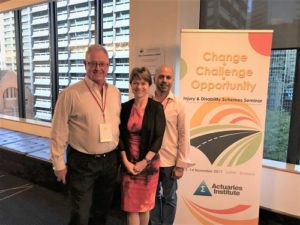SKL Consultants attended the 2017 Injury & Disability Schemes Seminar in Brisbane earlier this week.

Jas shares his insights:
‘We are so lucky to be living in Australia as it was brought to attention that the road accidents rate is so much better relative to other developed countries around the world. Victoria has led the way in minimising road fatalities and in the process protected so many families from being abruptly impacted by horrific road accidents. On a lighter note – as a result of these policies we also enjoy lower CTP rates relative to other developed countries so safety pays in more than one way. Keep up the good work.’
Jenny shares her insights:
‘There is a strong desire by all the injury schemes to improve health outcomes for individuals who are injured on the roads or in the work place and they are changing their focus to be outcomes and customer based.’
John shares his insights:
‘Key point to remember: Trauma is common: most people recover with the right help and support
The presentation “Improving PTSD outcomes through exercise” by Dr Simon Rosenbaum showed how structured exercise interventions are now a key component of the approach
used in supporting patients to recover from PTSD. This discussion showed the use of structured exercise interventions as a key component of the approach now used in supporting patients to recover from PTSD.
The presentation by Dr Jane Nursey from Phoenix Group who presented “PTSD: The Informed Health Consumer”, showed figures outlining the fact that Emergency workers have higher rates of Mental Health Disease (including PTSD), up to 20% in ambulance personnel, than the general population, approx. 4% of the Australian general population..
The fact that the economic cost to AU businesses of Mental Health Disease (including PTSD) is $11-12 Billion per annum means it has to be addressed.
Both presenters showed updates on greatly improved Prevention and Early Intervention procedures as well as the ongoing development of improved recovery methods which are being tailored to the individuals and their needs.’










